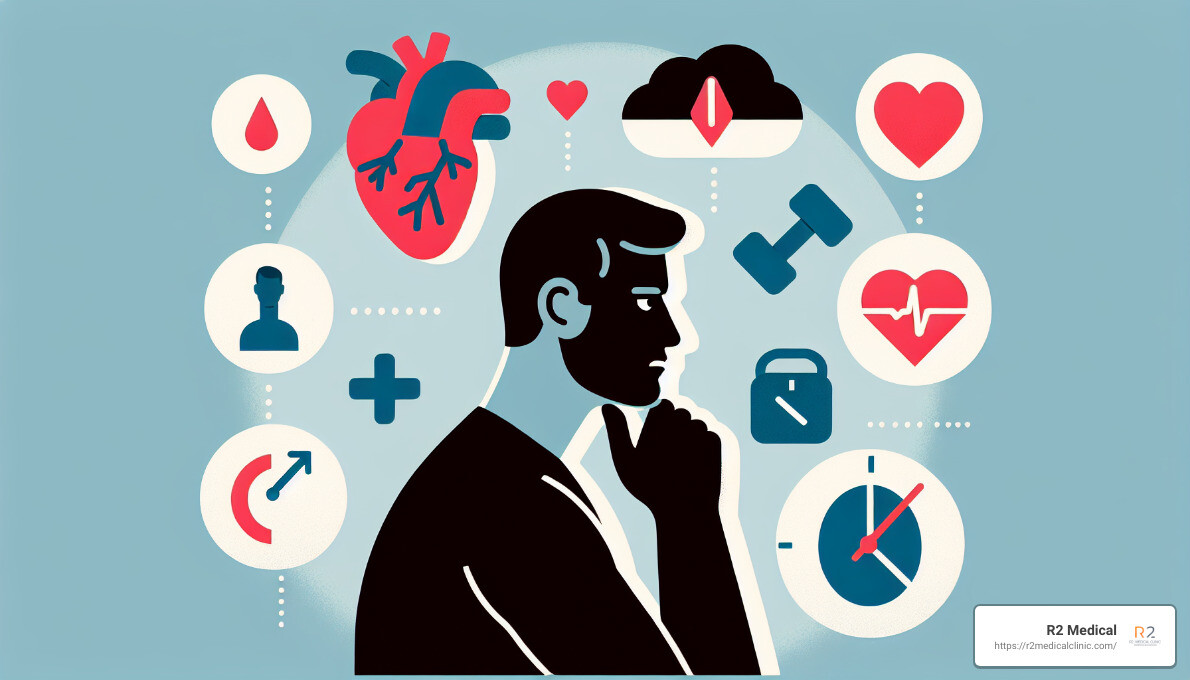
The Complete Guide to TRT Replacement Therapy Benefits
Have you been feeling a bit off lately? Perhaps, lacking in energy, motivation, or noticing a decline in your sexual function? These could be signs of low testosterone, a common condition that affects many middle-aged individuals. If you’ve been searching for ‘TRT replacement therapy’, you’re definitely not alone. At R2 Medical, we understand the journey and we’re here to provide the insights you need.
Testosterone Replacement Therapy (TRT), as the name suggests, is a treatment used to replenish the testosterone levels in the body.
- TRT can significantly improve symptoms associated with low testosterone such as reduced libido, low energy, decreased bone density and strength, and mood changes.
- It’s different from anabolic steroids in that it strategically uses lower doses of testosterone, aiming for hormonal balance rather than sudden and drastic muscle growth.
- Research has shown several benefits of TRT, that includes enhanced energy levels, increased bone density and muscle strength, and even cardioprotective effects.

However, it’s important to understand that TRT is not a one-size-fits-all solution, nor is it without controversy and potential risks. TRT is used primarily for men with symptomatic hypogonadism, a condition where the body is unable to produce sufficient testosterone. It’s considered a controversial treatment since declining testosterone levels can be considered a normal part of aging. Other concerns involve potential side effects and the cost of treatment. TRT, although beneficial for some, is an individualized treatment plan that requires a detailed assessment of one’s health conditions and lifestyle.
With that said, we want to guide you through understanding the full scope of TRT, from its benefits to associated risks and controversies. Afterwards, we’ll provide a roadmap on how to determine if TRT is right for you. Stick around to learn more about how we at R2 Medical approach TRT replacement therapy.
Now let’s delve deeper into TRT and how it functions in the body.
The Benefits of TRT Replacement Therapy
Testosterone Replacement Therapy (TRT) offers numerous benefits to individuals who are experiencing low testosterone levels. The effects of TRT can vary from person to person, as everyone’s body responds differently to hormones. Now, let’s explore the various benefits linked with TRT replacement therapy.
Boosting Energy Levels and Mood
One of the most reported benefits of TRT is an improvement in energy levels. Testosterone plays a crucial role in regulating energy, and low levels of this hormone can lead to fatigue and lethargy. TRT helps to restore testosterone levels, which in turn can enhance energy and vitality.
In addition to boosting energy, testosterone is also known to improve mood. According to Dr. Karen Herbst, an endocrinologist specializing in testosterone deficiency, many men report a general improvement in mood following TRT. However, the extent of this improvement can vary, ranging from barely noticeable to a major boost.
Enhancing Sex Drive and Erectile Function
Testosterone is closely linked to sex drive and erectile function in men. Research has shown that TRT can help enhance libido, improving sexual desire and performance. For instance, TRT has been found to significantly reduce penile venous leakage, a common cause of erectile dysfunction in older males. Furthermore, men undergoing TRT for low sex drive have reported an increase in sexual desire and nighttime erections.
Increasing Bone Density and Muscle Mass
Testosterone plays a significant role in maintaining bone density and muscle mass. Low testosterone levels can lead to decreased bone density, increasing the risk of fractures, and decreased muscle mass, leading to weakness and frailty. TRT can help increase bone density and muscle mass, potentially preventing these complications.
Improving Insulin Sensitivity
Emerging research suggests that TRT might also improve insulin sensitivity in some men. Insulin is a hormone that helps regulate blood sugar levels, and improved insulin sensitivity can help prevent type 2 diabetes and other metabolic disorders.
In conclusion, TRT replacement therapy can potentially offer a wide range of benefits from enhancing mood and energy levels, improving sexual health, to maintaining bone and muscle health and improving insulin sensitivity. However, remember that these benefits can vary based on individual response and the presence of other health conditions. At R2 Medical Clinic, we strive to provide personalized care, assessing each patient’s unique needs and circumstances to ensure the most beneficial outcomes from TRT replacement therapy.
The Risks and Controversies Surrounding TRT Replacement Therapy
Potential Side Effects of TRT
While TRT replacement therapy has numerous benefits, it’s critical to be aware of potential side effects. A small number of men may experience immediate side effects such as acne, disturbed breathing while sleeping, breast swelling or tenderness, or swelling in the ankles. Additionally, doctors monitor for high red blood cell counts, which could increase the risk of clotting.
More concerning is the potential for long-term cardiovascular risks. Some studies suggest men on long-term TRT may have a higher risk of heart attacks, strokes, and deaths from heart disease. For example, the Testosterone in Older Men study was halted when early results showed that men on TRT had noticeably more heart problems. There is also a concern that TRT could stimulate the growth of prostate cancer cells. While the evidence is mixed, doctors tend to be cautious, particularly with men who may already be at risk.
At R2 Medical Clinic, we take these potential risks seriously and monitor our patients closely during their TRT regimen to ensure their safety and health.
The Controversy: Is TRT a Normal Part of Aging or a Medical Necessity?
One of the key controversies surrounding TRT is whether it is a necessary treatment for a medical condition or simply a method to counteract the natural aging process. After all, testosterone levels naturally decline as men age, typically starting around age 40.
The aggressive marketing of TRT has led to increased awareness and interest, but remember that not every man with low testosterone levels needs or will benefit from TRT. In many cases, symptoms like general fatigue or malaise may not be due to low testosterone and can be addressed through lifestyle changes or other treatments.
The Cost of TRT Replacement Therapy
Another important factor to consider is the cost of TRT replacement therapy. Costs can range from $1,650 to $3,200 per year, depending on the type of TRT, the mode and frequency of administration, and a person’s insurance coverage. Before starting TRT, it’s crucial to understand the potential financial commitment involved.
At R2 Medical Clinic, we believe in transparency and will discuss all potential costs and benefits with you before beginning any treatment. We’re committed to providing the highest quality care while also considering our patients’ financial circumstances.
How to Determine if TRT Replacement Therapy is Right for You
Before embarking on the journey of TRT replacement therapy, it’s vital to discern whether it’s the right choice for you. We’re here to help guide you through this process at R2 Medical Clinic, and it generally involves understanding the symptoms of low testosterone, getting tested, and having a thorough discussion with your doctor.
Symptoms of Low Testosterone
Low testosterone can manifest in various ways, including fatigue, diminished energy levels, weight gain, and a decreased libido. Physical changes such as hair loss, reduced muscle mass, and an increase in body fat are also common indicators. If you’re experiencing these symptoms, it might be an indication that your testosterone levels are lower than usual.

Testing for Low Testosterone
If you suspect you’re dealing with low testosterone, the next step is to get tested. A blood test is usually the most reliable way to measure your testosterone levels. At R2 Medical Clinic, we recommend getting your testosterone levels tested in the morning when they’re typically at their highest.
Discussing TRT with Your Doctor: R2 Medical Clinic’s Patient-Centric Approach
Once you have your results, discuss them with your doctor. Here at R2 Medical Clinic, we value a patient-centric approach. We understand that each individual is unique, and therefore, we tailor our discussions and treatment plans to suit each patient’s specific needs and circumstances.
During your consultation, we’ll discuss your symptoms, test results, and overall health. We’ll also consider any underlying conditions that might be affected by TRT, such as prostate cancer, breast cancer, or severe heart conditions. It’s crucial to remember that TRT is not recommended for individuals with certain conditions, like obstructive sleep apnea or severe congestive heart failure.
Our team will guide you through the potential benefits and risks of TRT replacement therapy, helping you make an informed decision. We aim to provide a safe, effective, and personalized treatment plan for each of our patients. With our dedicated team, you can rest assured that your health and wellbeing are our top priorities.
Conclusion: Setting Realistic Expectations for TRT Replacement Therapy
As we wrap up this guide on TRT replacement therapy, it’s important to have realistic expectations about the treatment. While many individuals report significant improvements in energy levels, mood, sex drive, and physical health, responses can vary. As highlighted by endocrinologist Karen Herbst, MD, PhD, some men experience major changes, while others may not notice much difference. The majority, however, have generally positive but varying responses to testosterone replacement.
The Long-Term Implications of TRT
Long-term implications of TRT are still under investigation. Studies have shown potential risks, including an increased risk of heart attack or stroke, and worsening of conditions like benign prostatic hypertrophy (BPH), prostate cancer, sleep apnea, and blood clotting disorders. It’s crucial to weigh these potential risks against the benefits. Every medical treatment comes with potential side effects and risks, and TRT is no exception.
Alternatives to TRT Replacement Therapy
While TRT may be beneficial for many, it’s not the only solution. There are alternatives to consider. For example, lifestyle changes such as regular exercise, a balanced diet, stress management, and adequate sleep can help improve symptoms of low testosterone. Furthermore, therapies like ED shot therapy can be a promising treatment for erectile dysfunction, offering sustained improvements and high patient satisfaction. We at R2 Medical Clinic can guide you through these alternatives to find a comprehensive approach that suits your specific needs.
The Importance of Regular Monitoring and Follow-Up
Regardless of the treatment path you choose, regular monitoring and follow-up are crucial. This is especially true for TRT, given its potential risks. Regular check-ups allow us to monitor your testosterone levels, watch for side effects, and make necessary adjustments to your treatment plan. We believe in a patient-centric approach, where your health and wellbeing are our top priorities.
To conclude, TRT replacement therapy can significantly improve the quality of life for men experiencing low testosterone levels. However, it’s crucial to discuss with your healthcare provider and understand the potential benefits and risks. At R2 Medical Clinic, we’re here to help guide you on this journey towards improved health and wellbeing.
For more information on the services we provide, visit our Treatments page.




Leave a Reply